Living with blood cancer and pets
For many people living with blood cancer, their pets are an integral part of the family. They would be lost without the love and companionship pets add to their lives.
Your furry friends often can stay by your side during and after blood cancer treatment providing you consult with your treatment team and take the appropriate measures to reduce your risk of infection.
Read our top tips on how to safely care for your pets while undergoing and recovering from treatment.
 Talk to your treatment team
Talk to your treatment team
After receiving a blood cancer diagnosis, speak with your treatment team about your pet and your routine for taking care of them. Not all pets pose the same risks, and not all blood cancer treatments do either. Your treating team can provide advise on how to safely interact with your pet throughout your blood cancer treatment.
Understand the risks
When undergoing chemotherapy or a bone marrow transplant, there will be times where you are immunosuppressed and more susceptible to an infection. Avoid bites and scratches at this time and if your pet plays rough it may be necessary for your family or friends to look after them until your immune system recovers.
Visit your vet
Consult with your veterinarian to ensure your pet is up-to-date with its immunisations and booster shots. Ask whether any of the vaccinations are ‘live’ and check with your treatment team before these are given to your pet. Your vet can also prescribe medicines to prevent heartworm, fleas and ticks in dogs and cats.
If you have a cat, have it tested each year for feline leukemia (FeLV) and feline immunodeficiency (FIV) viruses. While these viruses cannot infect humans, they can weaken your cat’s immune system which can put them at risk of other infections that can infect humans.
Make hygiene a priority
Wash your hands after petting, caring for, touching or feeding your pets, and remember to wash your hands before taking medicine, handling food or anything in your kitchen.
Several illnesses can be spread through pet faeces and urine. Have someone else clean up after your pet or clean the litter box, and make sure it is not kept in the kitchen or anywhere you consume food. If you must do the clean-up, wear disposable waterproof gloves and wash your hands afterwards.
Always keep your pet’s sleeping areas as clean as possible and ensure your pet does not come into your bed while you are recovering from treatment.
Keep your pet healthy
Try to keep your pet on your own property or indoors to minimise their risk of picking up an infection from other pets and animals. Cats that go outside and hunt birds or small rodents are at risk of getting a parasitic infection called toxoplasmosis. While this infection tends not to make the cat sick, it can be very serious, even fatal, for a human with a weakened immune system.
Try to avoid dog parks and walk your dog on a leash in places where they won’t encounter other animals of unknown health.
Adopting a pet during treatment
While it is not usually recommended, some people do choose to get a new pet while undergoing treatment. If this is a choice you make, it is best to adopt a healthy pet that is at least 12 months old and to have it checked by your vet. Puppies and kittens tend to ‘play rough’, bite, and scratch, and have more ‘accidents’ that need cleaning up during toilet training.
Animals to avoid during treatment
It is best to avoid contact with birds, reptiles, rodents, and other exotic pets when undergoing blood cancer treatment. These animals are common carriers of salmonella and other rare but serious diseases. Salmonella can cause diarrhoea, skin infections, and other serious viruses which can be lethal for people whose immune systems are weakened. This germ can live for some time on surfaces and objects that an affected animal has touched, which means it can be transmitted without you handling the animal.
If you do choose to keep these animals as pets during treatment, ensure you follow the precautions above when handling, feeding, cleaning up after them or handling objects the animal has touched.
Real stories about living with blood cancer and pets
Lyndell’s passion for her pets keeps her strong
Lyndell Wills is a bone marrow transplant recipient, has survived myelodysplastic syndrome (MDS) and acute myeloid leukaemia (AML) and is mum to chickens, Sox the cat, and dogs, Meggs and Molly.
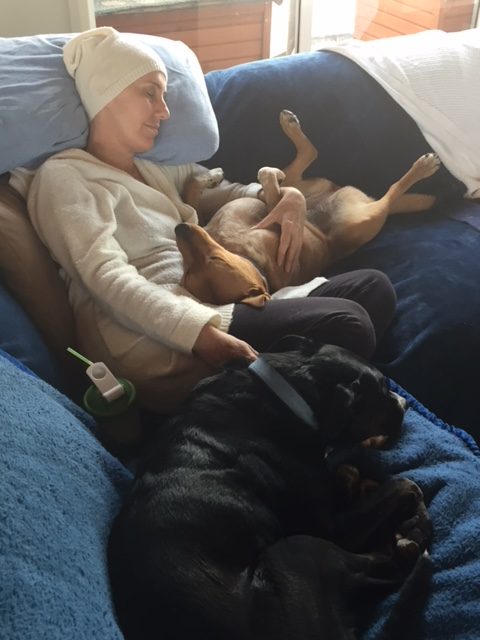
She was diagnosed with MDS in 2015 with it progressing to AML in late 2017.
“I was basically neutropenic from my first diagnosis, but things really ramped up when I got the AML diagnosis and was told I would need chemotherapy and a bone marrow transplant,” said Lyndell, who lives on Lake Macquarie (NSW).
“When we travelled to Sydney for my treatment, my husband and I had to leave the chickens, cat, and two dogs behind to be looked after by friends and family.
“For the first four weeks in hospital I was constantly asking my treatment team when I would be able to see them again.
“We did speak about bringing them to the side entrance of the hospital for a quick visit, but I decided that would just confuse them, with the different smells and environment.
“Throughout my whole treatment I kept photographs of my animals up on the walls of the hospital room, so they were with me in some way and gave me strength.”
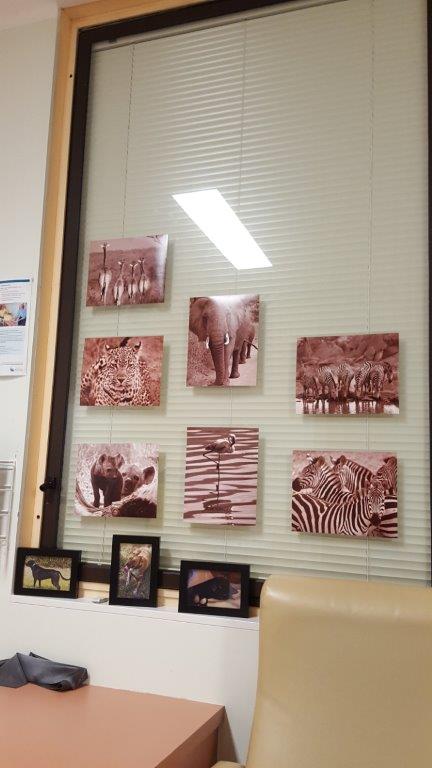
Lyndell’s transplant, from an unrelated matched donor, was in December 2017.
“I stayed at the Westmead Leukaemia Foundation Patient Accommodation Centre for my three-month recovery,” said Lyndell, mum to daughters, Shannon, 20, and Zoe, 16.
‘’That was the most challenging time, having to be away from my two daughters and pets for so long, but we did manage a few short visits back home when I started feeling better.
“The chickens are obviously recognised as one of the high-risk animals for infections.
“We spoke to the haematologist who ran through how we can best manage that, and I certainly got out of cleaning chicken poop out of the cage for a good three years.
“But I would still sit and watch them, I just loved that when I was in the middle of treatment and feeling my weakest because they’re so busy, inquisitive, and very entertaining.”
Having dogs has also provided Lyndell with the motivation to get out and about again.
“Some days you don’t really feel like getting out of bed and want to bury yourself under the covers,” said Lyndell.
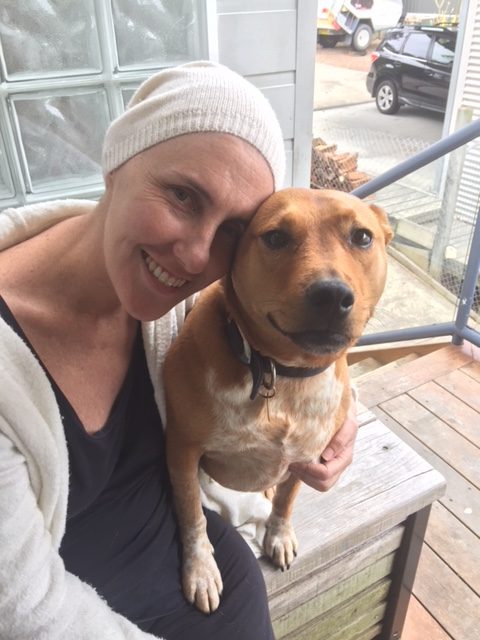
“But then you see that look in their eyes willing you to take them for a walk.”
“I now try and do something with the dogs most days. Some days it’s a shorter walk than others but it’s better than staying couped up all day.”
Lyndell encourages people to speak with their treatment team and practice good hygiene when handling their pets.
“You’ve just got to be sensible. After patting or feeding the animals, I always get up and wash my hands,” said Lyndell.
“If you’ve got an open wound, don’t let the pet near it, and avoid scratches.
“I would also highly recommend seeing a psychologist and talking about this adjustment to your lifestyle for the good of your health.
“You don’t realise what a big impact it can have on you mentally and the decision to keep pets, while it was non-negotiable for me, some people may need to work through that choice and understand what the best approach is for them.”
Lyndell also runs an online support group called, Transplant Tribe, for those who have had, or are planning to have, a bone marrow transplant, as well as their family and friends. Find out more at www.transplanttribe.com.au.
Pets ‘like therapy’ to Barb through treatment
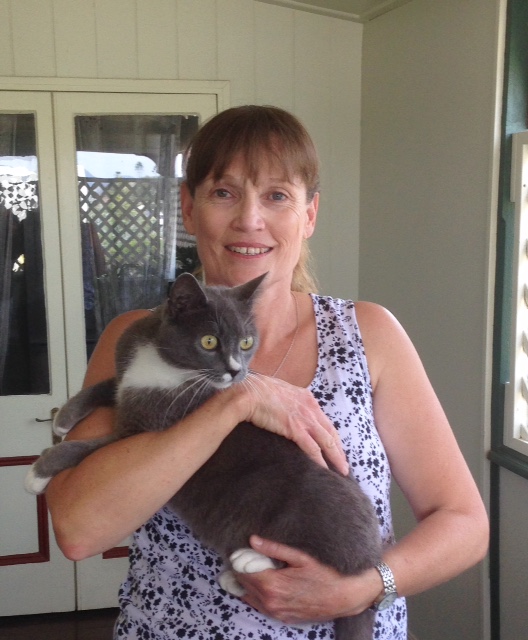
Barb Vezos, who couldn’t imagine life without her beloved pets, prioritised hygiene and health so she can continue taking care of them safely.
Diagnosed with acute myeloid leukaemia (AML) in 2015, Barb underwent chemotherapy and a bone marrow transplant from an unrelated matched donor. At the time of her diagnosis, she was a single mum to two boys, and had four pets to care for.
“One of my dogs went with my sons to their uncle’s place, and my neighbours fed both my older dog and cats for me while I stayed at the Clem Jones-Sunland Leukaemia Foundation Patient Accommodation Centre during my nine-month treatment in Brisbane,” said Barb, from Beaudesert (Queensland).
“I’m so grateful for their support, it was really important to have my pets taken care of by people I know and trust.
“Unfortunately, one of the cats and dogs passed away while I was going through treatment which was really devastating…but I still returned home to Kitty the cat and my dog, Daphne, who were ecstatic to have me back.”
Before going home, Barb she spoke to her treatment team about caring for her pets safely and ensuring she minimised her risk of infection.
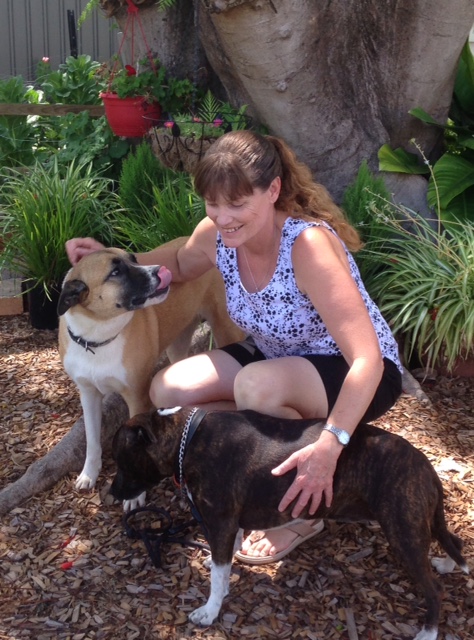
“I did have the option to re-home them, but I decided to just see how I went with them and if I ended up with an infection or allergies, then I would reassess,” explained Barb.
“My cat is really good, she’s not scratchy and she does her own thing most of the time.
“My dog, Sydney, was a new addition at the end of 2017. Both dogs are content to just sit by me, they don’t have to be all over me. Sometimes I look into their eyes and just know, they know what’s going on – they are so gentle.
“They can come inside, but I tend not to let them on the couch and bed now, and I am constantly washing my hands after touching and feeding them.”
Barb still remembers the week between chemotherapy and her transplant when she went home and could spend time with her pets.
“I think that was the most relaxed I had been the whole year. To just have that constant companionship was like therapy to me,” said Barb.
“I don’t know how to explain it, but the pets give me a sense of peace and are the best company in the world.
“I’ve always had animals and I couldn’t imagine my life without them.”
References
American Cancer Society. Infections and Pet Safety [Internet] 2020
Leukaemia & Lymphoma Society. Pets and Cancer: How to Care for Yourself & Your Furry Friends During Treatment [Internet] 2020
Memorial Sloan Kettering Cancer Center. Returning Home After Your Autologous Stem Cell Transplant: Pets [Internet] 2019
Cleveland Clinic. Preventing Infection After Bone and Marrow Transplant [Internet] 2019
Very Well Health. Keeping Pets When You’re Diagnosed With Cancer [Internet] 2020
Children’s Cancer and leukaemia Group. Children with cancer and pets [Internet] 2014
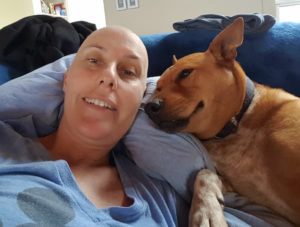 Talk to your treatment team
Talk to your treatment team